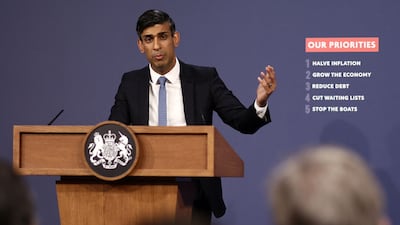UK Prime Minister Rishi Sunak has accepted a 6 per cent pay rise for public sector workers, potentially paving the way for the end to widespread strikes.
Mr Sunak challenged other unions to “know when to say yes” after he accepted the recommendations of independent pay review bodies.
Junior doctors, who began a walkout yet in England on Thursday, will receive 6 per cent rises, along with an additional consolidated £1,250 increase.
Hospital consultants, set to strike in England next week, will receive a 6 per cent rise.
The 6.5 per cent pay award for teachers will be “fully funded”, the government said, with £525 million ($688 million) of additional money for schools in 2023-24 and a further £900 million in 2024-25.
The government set out some changes to raise about £1 billion of additional money to fund the rises, including increasing the immigrant health surcharge to £1,035 and raising the cost of some visas.
But the bulk of the money will have to come from “savings and efficiencies” in existing budgets.
Speaking from Downing Street, Mr Sunak said departments will have to fund the pay rises “elsewhere” rather than from more borrowing.
“Clearly, this will cost all of you as taxpayers more than we had budgeted for,” he said.
“That’s why the decision has been difficult, and why it has taken time to decide the right course of action.”
One way the government will raise funds will be by “significantly” raising fees for migrants’ visa applications and NHS access, Mr Sunak added.
He urged union bosses to “do the right thing and know when to say yes” by accepting the pay offer and calling off the strikes.
“Today’s offer is final. There will be no more talks on pay. We will not negotiate again on this year’s settlements and no amount of strikes will change our decision,” he said.
He added that the accepted recommendations were a “fair deal for the British taxpayer”.
Britain has been gripped by strikes for well over a year, with junior doctors launching the longest walkout in NHS history on Thursday as they try to secure a pay rise of more than one third.
Union bosses have demanded inflation-busting wage increases to offset years of real terms pay decreases.
Britain's doctors begin longest strike in NHS history – in pictures
The new pay recommendations will “allow teachers and school leaders to call off strike action and resume normal relations with government”, teachers unions said in a joint statement with the Prime Minister and Education Secretary.
However, the British Medical Association chairman said that Mr Sunak's latest pay deal was a “huge opportunity to put the strikes to an end”.
Phil Banfield said consultants “remain willing to talk” but the offer means “they are likely to continue to take industrial action”.
Chancellor Jeremy Hunt earlier said the government would take “difficult but responsible” decisions on the nation’s finances and public sector pay in order to manage debt and curb inflation.
The current level of CPI inflation is running at 8.7 per cent and Mr Sunak – who has promised to cut it to around 5.3 per cent by the end of the year – wants to avoid pay increases which could fuel a wage-price spiral.
Mr Hunt told MPs on Thursday that “it is important to deliver on the Prime Minister’s priority to get debt falling and to control borrowing to avoid adding inflationary pressures and risk prolonging higher inflation”.
“That means taking difficult but responsible decisions on the public finances, including public sector pay, because more borrowing is itself inflationary.”







